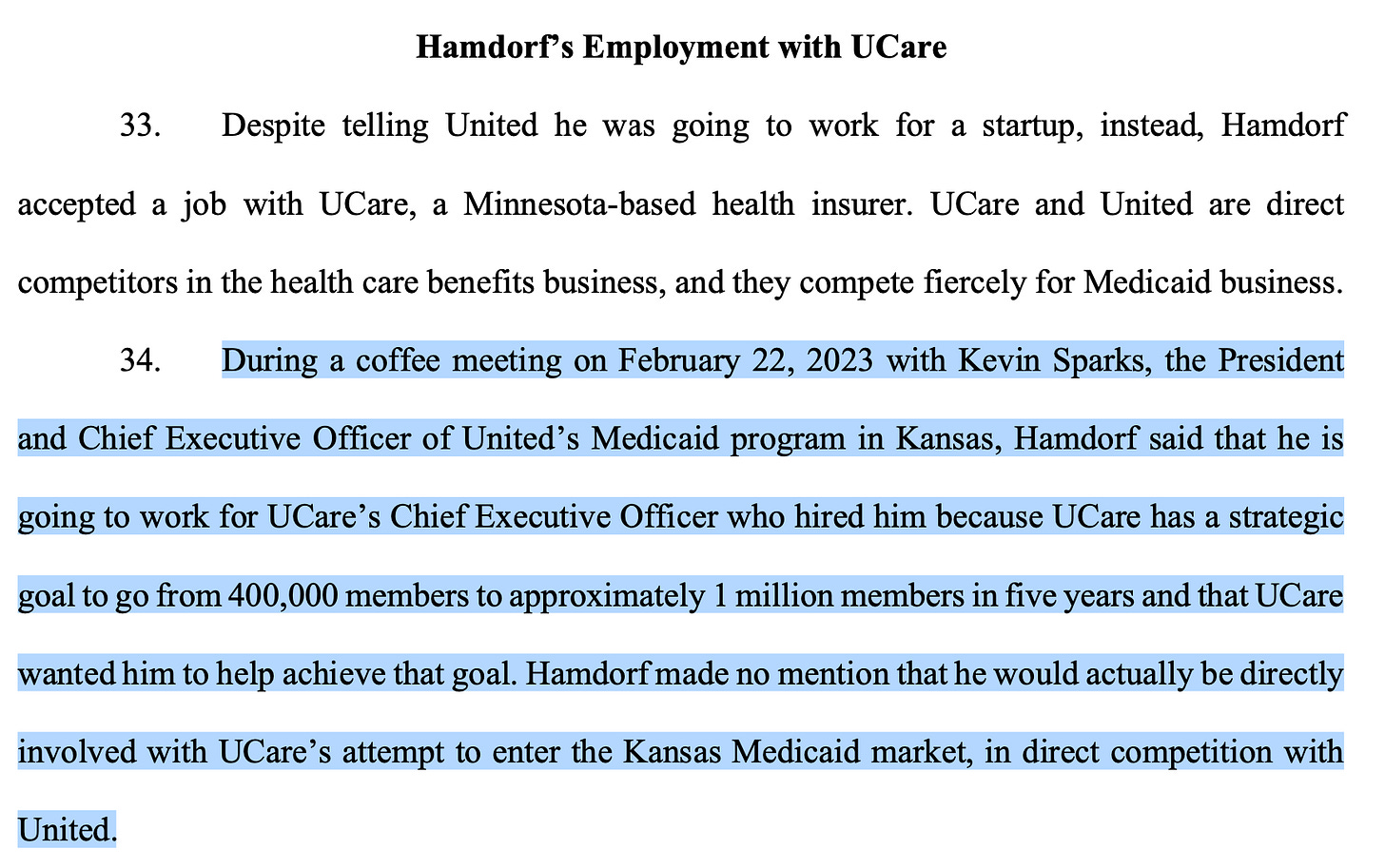Kansas Medicaid Department's Revolving Door Threatens Race For Billion Dollar Contracts
A non-compete dispute between United Healthcare and its former executive may hamper a newcomer's bid to run the Kansas Medicaid program.
Feb. 5, 2024 Update: This post has been updated to reflect a Jan. 31, 2024 court ruling.
The competition to run the Kansas Medicaid program starting in 2025 has begun, and it is like no other in the state’s history. New contracts will be announced in April, the first ones awarded under a Democratic administration since Kansas privatized its Medicaid program in 2013. Governor Laura Kelly is looking to make Kansas the 42nd state (including DC) to expand Medicaid under the Affordable Care Act, which would unlock more than $1.2 billion in additional federal funds per year—plus an extra $135 million Kansas would cover. That means a jump of about 31% in annual spending.
In other words, the stakes are high for the bidders competing to run the program known as KanCare. They’re even higher for hundreds of thousands of low-income Kansans whose healthcare is on the line, while their government representatives decide who should be in charge of administering their benefits.
Given the billions of dollars on the table, it’s no surprise that seven companies submitted proposals for the new contracts before the January 4 deadline. They include the three incumbents, Aetna, UnitedHealthcare (UHC), and Centene, which are among the largest national players in the Medicaid business. They also include some newcomers: Molina (another big vendor), Healthy Blue (a collaboration between big vendors Blue Cross and Blue Shield and Anthem), CareSource (a smaller regional company), and UCare (an even smaller regional company).

Behind the scenes, a legal battle is brewing between two of these bidders that may impact the outcome of the competition. UHC, the largest healthcare company in the country, is quietly trying to enforce a non-compete agreement against the racehorse UCare hired last February specifically to lead its proposal for a KanCare contract: Jonathan Hamdorf. He was a huge get for UCare, given he was not only UHC’s Chief Operating Officer in Kansas, but previously the Kansas Medicaid Director from August 2017 to February 2019. (This legal dispute aside, it may raise ethical concerns that Hamdorf held his position as the state’s Medicaid Director and is now working for a company seeking to run the program, just as it arguably should have when he went to serve as COO of UHC in Kansas from July 2020 to September 2022. It was during this time that Hamdorf signed the non-compete at issue.)
Thanks to a temporary order enforcing the noncompete, Hamdorf hasn’t been able to work on UCare’s offer since August. This may not only hurt UCare’s likelihood of winning a contract, but it could make the whole auction less competitive, depriving the Kansas government and Medicaid enrollees of the chance to get the best vendors for the job. That’s especially concerning for Kansas, where the Medicaid market is fairly concentrated compared to other states. And while local / regional insurers control 38% of the market nationally, KanCare is entirely dependent on Big 5 companies. That’s not necessarily in the best interests of Kansans or government payers.
But if UCare wins a contract, that would bring at least some stewardship over KanCare to more regionally-based hands, given it operates in Minnesota and Wisconsin alone. Hamdorf’s non-compete with UHC raises questions over whether UCare did its proper due diligence before putting him at the helm of its campaign.
The present legal dispute began when UHC initiated arbitration proceedings against Hamdorf to enforce its non-compete in May 2023. The company’s claims against him were kept private until a federal judge unsealed them earlier this week. UHC offered strong evidence, including the following:
UHC began its case in arbitration per a policy Hamdorf signed that made arbitration the exclusive forum for any claims arising from his employment or a breach of contract with the company. Such mandatory arbitration agreements are controversial today and viewed by some policymakers and employee advocates as an impediment to public justice, though others insist it facilitates more efficient resolution of disputes than the court system.
UHC requested a temporary order to enforce the non-compete, which the arbitrator, Angela Gupta, granted in August 2023. The order, which was also unsealed this week, held that:
“Respondent Jonathan J. Hamdorf is immediately enjoined from engaging, participating, or assisting UCare, in any manner, in strategizing, planning for, or submitting a Request for Proposals (“RFP”) by UCare to the State of Kansas for a Medicaid contract, including but not limited to identifying or including Mr. Hamdorf on or within any RFP response on behalf of UCare.”
Two months later, Hamdorf filed a motion to vacate that decision in the U.S. District Court in Kansas.
On January 4, Judge Holly Teeter denied the motion, keeping the temporary order in effect. She disagreed with Hamdorf’s argument that UHC’s arbitration policy required motions for temporary relief to be filed in court, asserting that the provision states that parties merely may seek temporary relief in court, not that they had to. She did not respond to another supporting argument he made against UHC, that “a party typically seeks temporary or injunctive relief to enforce a restrictive covenant when there is an immediate, emergency need ‘to prevent great and irreparable injury.’”
UHC then tried to convince the Court to confirm the arbitrator’s temporary order.
And on January 31, Judge Teeter handed down her decision to confirm. The order says that Hamdorf notified the Court he did not oppose. It’s unclear if that amounts to an admission he violated his non-compete or if he was just trying to move forward.
Meanwhile, the status of the arbitration proceedings over the non-compete is unclear. Per Hamdorf’s complaint, a final hearing was scheduled for November 6-8, 2023, but it was informally postponed. UHC’s motion to confirm the temporary order also says that “the matter is still pending.”
While the dispute between UHC and Hamdorf plays out, with potential ramifications for UCare’s bid, Kansas will have to negotiate with vendors and award Medicaid contracts based on what appears to be a sub-optimal competitive process. The situation may pressure the Kansas government to consider placing tighter guardrails on public officials working in private sector positions that directly benefit from inside knowledge.







Great writing. Love reading your articles. Keep up the good work!
Excellent article, consider revisiting now that contracts are awarded.